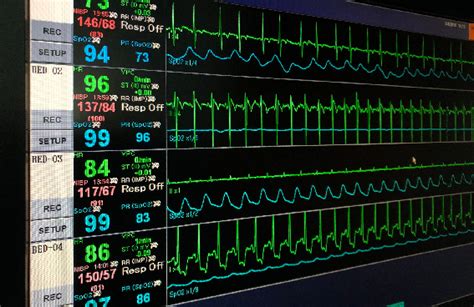Intro
Unlock the world of telemetry nursing, a specialized field that combines nursing expertise with technical skills to monitor patients vital signs remotely. Learn about the role, responsibilities, and benefits of telemetry nursing, including patient care, data analysis, and healthcare technology. Discover how telemetry nurses improve patient outcomes and revolutionize healthcare.
Telemetry nursing is a specialized field of nursing that involves the use of electronic monitoring devices to observe and care for patients with cardiovascular and other conditions that require close monitoring. Telemetry nurses work in hospitals, clinics, and other healthcare settings, using advanced technology to track patients' vital signs, heart rhythms, and other physiological data in real-time.
The role of telemetry nurses is crucial in identifying potential complications and providing timely interventions to prevent serious health issues. These nurses work closely with physicians, other nurses, and healthcare professionals to develop and implement individualized care plans that address the unique needs of each patient.

Telemetry nursing requires a strong foundation in cardiac anatomy, physiology, and pharmacology, as well as expertise in electrocardiogram (ECG) interpretation and other diagnostic tests. Telemetry nurses must also possess excellent communication and critical thinking skills, as they often serve as the primary point of contact for patients and families.
Benefits of Telemetry Nursing
Telemetry nursing offers numerous benefits for patients, families, and healthcare providers. Some of the key advantages of telemetry nursing include:
- Improved patient outcomes: Telemetry nursing enables healthcare providers to quickly identify potential complications and provide timely interventions, which can lead to better patient outcomes and reduced morbidity and mortality.
- Enhanced patient safety: Telemetry nursing helps to reduce the risk of adverse events, such as cardiac arrests, strokes, and other serious health issues.
- Increased efficiency: Telemetry nursing streamlines the care process by allowing nurses to monitor multiple patients simultaneously, which can improve workflow and reduce healthcare costs.
- Better patient experience: Telemetry nursing enables healthcare providers to provide more personalized care and attention to patients, which can lead to higher patient satisfaction and improved health outcomes.
Key Responsibilities of Telemetry Nurses
Telemetry nurses have a range of responsibilities, including:
- Monitoring patients: Telemetry nurses use electronic monitoring devices to track patients' vital signs, heart rhythms, and other physiological data in real-time.
- Interpreting ECGs: Telemetry nurses interpret ECGs and other diagnostic tests to identify potential complications and develop care plans.
- Developing care plans: Telemetry nurses work with healthcare providers to develop individualized care plans that address the unique needs of each patient.
- Providing education: Telemetry nurses educate patients and families about their conditions, treatments, and self-care strategies.
- Collaborating with healthcare providers: Telemetry nurses work closely with physicians, other nurses, and healthcare professionals to ensure that patients receive comprehensive and coordinated care.
Skills and Qualifications Required for Telemetry Nursing
Telemetry nursing requires a range of skills and qualifications, including:
- Basic life support certification: Telemetry nurses must have basic life support certification, such as BLS or ACLS.
- ECG interpretation skills: Telemetry nurses must have expertise in ECG interpretation and other diagnostic tests.
- Critical thinking skills: Telemetry nurses must possess excellent critical thinking skills to quickly identify potential complications and develop care plans.
- Communication skills: Telemetry nurses must have strong communication skills to work effectively with patients, families, and healthcare providers.
- Technical skills: Telemetry nurses must have technical skills to operate electronic monitoring devices and other medical equipment.

Challenges and Opportunities in Telemetry Nursing
Telemetry nursing is a dynamic and challenging field that requires nurses to stay up-to-date with the latest technologies, treatments, and best practices. Some of the key challenges and opportunities in telemetry nursing include:
- Technological advancements: Telemetry nursing is constantly evolving, with new technologies and innovations emerging regularly.
- Staffing shortages: Telemetry nursing is a specialized field that requires highly skilled and experienced nurses, which can lead to staffing shortages and challenges.
- Patient acuity: Telemetry nursing involves caring for patients with complex and high-acuity conditions, which can be challenging and demanding.
- Professional development: Telemetry nursing offers numerous opportunities for professional development and advancement, including certification programs, continuing education, and leadership roles.
Conclusion
Telemetry nursing is a specialized field that requires a strong foundation in cardiac anatomy, physiology, and pharmacology, as well as expertise in ECG interpretation and other diagnostic tests. Telemetry nurses play a critical role in identifying potential complications and providing timely interventions to prevent serious health issues. With the increasing demand for telemetry nursing services, there are numerous opportunities for nurses to pursue careers in this field and make a meaningful difference in the lives of patients and families.
What is telemetry nursing?
+Telemetry nursing is a specialized field of nursing that involves the use of electronic monitoring devices to observe and care for patients with cardiovascular and other conditions that require close monitoring.
What are the benefits of telemetry nursing?
+Telemetry nursing offers numerous benefits, including improved patient outcomes, enhanced patient safety, increased efficiency, and better patient experience.
What are the key responsibilities of telemetry nurses?
+Telemetry nurses have a range of responsibilities, including monitoring patients, interpreting ECGs, developing care plans, providing education, and collaborating with healthcare providers.
